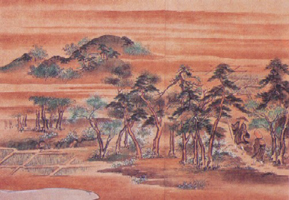| amari-no-kokoru: |
the heart/soul of the
poem must reach far beyond the words themselves, leaving an indelible
aftertaste |
| aware: |
emotion initiated by engagement of
the senses |
| fuga-no-michi |
Way of Elegance |
| haibun: |
short prose passages combined with
haiku |
| haikai no renku: |
linked verses |
| haiku: |
an unrhymed Japanese poem recording
the essence of a moment keenly perceived (usually presented
through the juxtaposition of two seemingly unrelated concrete
images), in which nature is linked to human nature. It usually
consists of 17 jion (Japanese symbol-sounds) arranged
in a 5-7-5 pattern. Originally functioned as the opening verse
(hokku) of a tanka. |
| honkadori: |
borrowed or quoted lines or
phrases |
| jisei: |
death poem |
| kado: |
Way of Poetry, alternative set of
values provided by poetry; marked by fuga-no-michi,
|
| kajitsu: |
formal aspects of the poem |
| kanshi: |
poetry written in Chinese |
| karon: |
essay on literary criticism |
| karumi |
poetic lightness—plain, simple,
artless language |
| kireji: |
a cutting word; a special word
in Japanese that indicates the pause, the end of the clause.
It's not translated into English, but can be imitated with punctuation
('...', '--', ':', '!') or with proper line breaks (usually
kireji splits haiku into two parts, the pause occurs at the
end of the first or the second line). |
| kokai: |
a feeling of regret after reading
a poem, a consequence of the poet having failed to think sufficiently
deeply prior to its composition |
| kokoru: |
the heart and mind of a literary work
(its sincerity and conviction) |
| makoto: |
truth; sincerity; honesty; faithfulness
("masculine" Shogun value) |
| mono-no-aware: |
the perception of a natural poignancy
in the beauty of temporal things |
| mushin: |
the art of artlessness; directness
of emotion achieved without ornament |
pillow word
(makura kotoba): |
a fixed epithet, frequently allowing
for double entendre or multiple evocation (ex.: "clouds and rain"
= reference to sexual act in addition to weather condition) |
pivot word
(kake kotoba) |
plays on different meanings of a word
that links two phrases; creates deliberate ambibuity, often implying
polysignation |
| sabi: |
an undertone of existential Zen loneliness |
| shibumi: |
elegantly understated, unpretentious
natural beauty |
| shih: |
lyric verse composed in five- or seven-character
lines written in Chinese |
| wabi: |
an elegant simplicity tinged with
sabi, an undertone of loneliness |
| waka: |
classical poem of five lines measured
in syllabic lines of 5-7-5-7-7 |
| Way of Poetry: |
see "kado" |
| yugen: |
aesthetic feeling or depth
of meaning subtly or implicitly (not explicitly) expressed |
| |
|
| |
|
| |
|
| |
|
| |
|
| |
|

 "Even
if you have three or four extra syllables, or even five or seven, you
needn't worry aslong as it sounds right. But if even one syllable is stale
in your mouth, give it all of your attention." —Bash
"Even
if you have three or four extra syllables, or even five or seven, you
needn't worry aslong as it sounds right. But if even one syllable is stale
in your mouth, give it all of your attention." —Bash